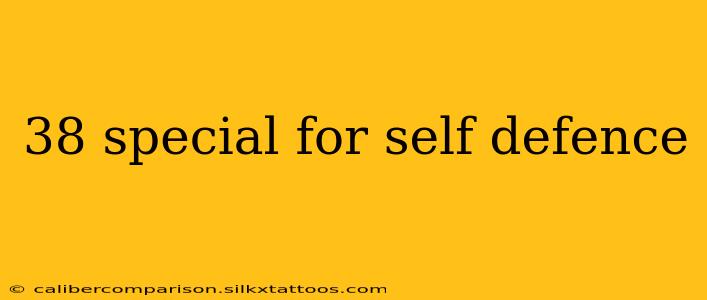The .38 Special remains a popular choice for self-defense, boasting a long history and proven effectiveness. However, choosing the right firearm and understanding its limitations are crucial for responsible self-defense. This guide delves into the pros and cons of using a .38 Special for personal protection, offering a balanced perspective for informed decision-making.
The .38 Special: History and Ballistics
The .38 Special, introduced in 1898, has a rich history in law enforcement and civilian self-defense. Its relatively low recoil makes it manageable for a wide range of users, and its readily available ammunition contributes to its enduring popularity. The cartridge fires a relatively heavy bullet at a moderate velocity, resulting in adequate stopping power at close to medium ranges. However, it’s important to understand its limitations compared to more modern cartridges.
Ballistic Performance:
- Stopping Power: While generally effective, the .38 Special's stopping power depends heavily on bullet type and placement. Hollow-point ammunition is generally preferred for its ability to expand upon impact, increasing the wound channel and energy transfer.
- Range: The .38 Special is most effective at close range. Accuracy and effectiveness diminish significantly beyond 25 yards.
- Penetration: Penetration can vary greatly depending on the bullet type. Full metal jacket (FMJ) rounds penetrate deeper than hollow points, while hollow points expand and transfer more energy to the target, potentially reducing penetration.
Advantages of the .38 Special for Self-Defense
- Ease of Use: The manageable recoil makes it suitable for smaller-framed individuals or those new to firearms.
- Ammunition Availability: .38 Special ammunition is widely available and relatively inexpensive.
- Revolver Reliability: Revolvers chambered in .38 Special are generally known for their reliability and simplicity. They don't rely on complex feeding mechanisms prone to malfunctions.
- Proven Track Record: Decades of use in law enforcement and personal defense have established its effectiveness.
Disadvantages of the .38 Special for Self-Defense
- Stopping Power Compared to Modern Cartridges: Compared to more modern calibers like 9mm or .45 ACP, the .38 Special offers less stopping power. This means that multiple shots may be necessary to stop a threat.
- Limited Range: Its effectiveness decreases significantly beyond close range.
- Potential for Overpenetration (with FMJ rounds): Full metal jacket rounds can penetrate walls and other obstacles, posing a risk to bystanders.
Choosing the Right Firearm and Ammunition
Selecting the appropriate firearm and ammunition is paramount. Consider these factors:
- Revolver vs. Semi-Automatic: While revolvers are generally more reliable, semi-automatic pistols offer higher capacity.
- Barrel Length: A longer barrel can contribute to increased velocity and accuracy.
- Ammunition Selection: Hollow-point ammunition is generally recommended for self-defense due to its increased expansion and energy transfer. Consider researching different brands and types to find what performs best in your chosen firearm.
Beyond the Firearm: Training and Legal Considerations
Owning a firearm for self-defense is a significant responsibility. It’s crucial to receive proper training from a qualified instructor. This includes safe handling, proper shooting techniques, and understanding relevant laws and regulations in your jurisdiction. Furthermore, understanding the legal ramifications of using a firearm in self-defense is vital.
Conclusion: Is the .38 Special Right for You?
The .38 Special remains a viable option for self-defense, particularly for those seeking a manageable firearm with readily available ammunition. However, it's vital to weigh its advantages and disadvantages against modern alternatives. Careful consideration of the firearm's limitations, coupled with rigorous training and a thorough understanding of the law, are essential for responsible and effective self-defense. Ultimately, the best choice depends on individual needs, physical capabilities, and local regulations. Remember, this information is for educational purposes only and should not be considered a substitute for professional training and advice from a certified firearms instructor and legal professional.

